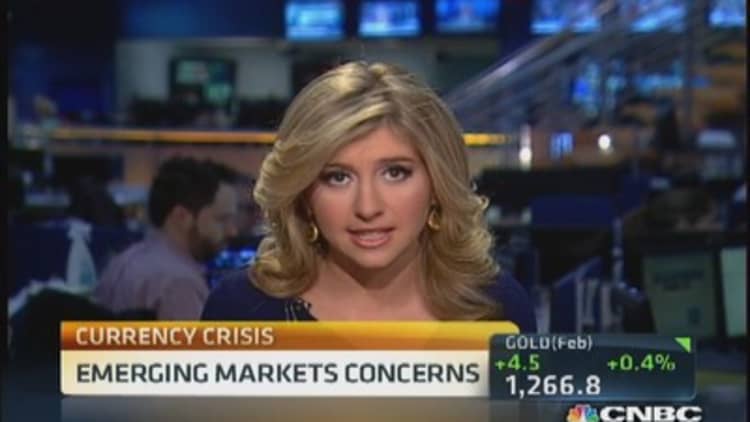The yen surged to a seven-week high against the dollar, while the Swiss franc climbed to a five-week peak against the euro on Friday as investors sought refuge in safe-haven assets after a selloff in emerging market currencies.
This week, the Turkish lira plunged to a record low and the Argentine peso suffered its largest one-day decline in more than a decade. The South African rand, meanwhile, dropped to its lowest in five years on Friday, while the Brazilian real slid to a five-month trough.
"Global investors remain firmly risk-averse—the selloff in emerging markets this week, triggered in part by the steep decline in the Argentinian peso—has fuelled renewed concerns about the eventual withdrawal of liquidity as the Federal Reserve tapers its quantitative easing program," said Samarjit Shankar, director of market strategy at BNY Mellon in Boston.
(Read more: Could this be the currency to short in 2014?)
He said BNY's bond indicators showed that portfolio managers were reducing their exposure to emerging market local currency debt in countries like Indonesia, Thailand, and Peru.
The fell to a seven-week low of 101.98 yen and was last at 102.30, down 0.9 percent, while the euro slid to 1.2222 francs, its weakest level since Dec. 18. The euro last traded at 1.2242 francs, 0.4 percent lower.
The euro was down 0.1 percent versus the dollar at $1.3676, having jumped 1.1 percent on Thursday, stalling ahead of resistance at $1.37.
Both the dollar and euro fell as much as 1 percent against the yen, pressured as well by worrying signs of a slowdown in China and broad expectations of a tightening of monetary conditions this year by some of the world's biggest central banks.
(Read more: IMF 'very positive' US can taper and grow: Deputy MD)
"Markets will rightly speculate that Japanese investors are exiting or at least hedging their overseas investments, and there is also an argument that foreigners using the yen as a funding currency are being squeezed out of some positions," Robert Lynch, global head of G10 currency startegy at HSBC, wrote clients on Friday.
Amid a jumbled start to the year for major currency markets, analysts believed money was set to drain out of emerging market economies. Supporting this view, investors have bid strongly for a flurry of large bond issues in the euro zone this month.

That helps explain, along with lackluster U.S. data on Thursday, why the year's other big bet of a stronger dollar against the euro has yet to materialize.
"European assets have become a sort of safe haven for investors," said Alvin Tan, currency strategist at Societe Generale in London.
(Read more: UK forward guidance safe… for now)
"We've seen Spanish and Portuguese debt being very well-received by the market. What many people also often forget is that Germany has a bigger current account surplus in dollar terms than China."
Data published on Thursday showed the euro zone current account surplus hit a record high in November.
More broadly, the banking and debt crisis that began in 2007 finally appears to be easing in Europe, and this year should see central banks begin to reel in some of the enormous volumes or cash they have pumped into the world economy.
Currencies
Citibank's head of global G10 FX strategy in New York, Steven Englander, pointed to signs this week of the Swiss National Bank moving to cool the country's housing market and growing expectations of an early rate rise in the UK as hints that this process is accelerating.
(Read more: Currencies – the year behind and the year ahead)
In other currencies, the fell to US$0.8658, its lowest in 3-1/2 years after Reserve Bank of Australia board member Heather Ridout was reported as saying the currency had not fallen enough and that the currency at 80 U.S. cents would be a "fair deal" for the economy.
Sterling has also done well in January, surging to its highest against the dollar in almost three years on Friday on speculation the Bank of England could raise interest rates before the end of the year. But by late afternoon trading, the pound was down 0.8 percent at $1.6503.
—By Reuters

